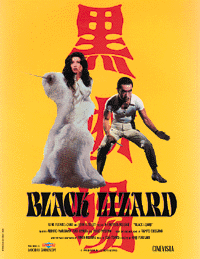
Kinji Fukasaku was a Japanese film director and screenwriter. Known for his "broad range and innovative filmmaking", Fukasaku worked in many different genres and styles, but was best known for his gritty yakuza films, typified by the Battles Without Honor and Humanity series (1973–1976). According to the Berkeley Art Museum and Pacific Film Archive, "his turbulent energy and at times extreme violence express a cynical critique of social conditions and genuine sympathy for those left out of Japan's postwar prosperity." He used a cinema verite-inspired shaky camera technique in many of his films from the early 1970s.
Kogoro Akechi is a fictional private detective created by Japanese mystery writer Edogawa Ranpo.

Akihiro Maruyama, better known by his stage name Akihiro Miwa, is a Japanese singer, actor, director, composer, author and drag queen.

Battles Without Honor and Humanity: Police Tactics is a 1974 Japanese yakuza film directed by Kinji Fukasaku. It is the fourth film in a five-part series that Fukasaku made in a span of just two years.
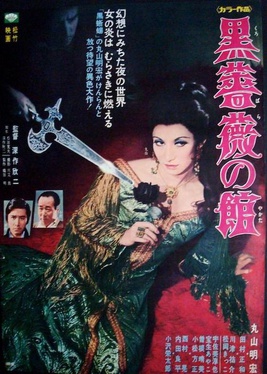
Black Rose Mansion, also known as Black Rose, is a 1969 Japanese drama film directed by Kinji Fukasaku.
Janet Hatta is an actress.

K-20: Legend of the Mask is a 2008 Japanese action film written and directed by Shimako Satō and based on a novel by Sō Kitamura and its sequel. The film was released worldwide on December 20, 2008. Takeshi Kaneshiro and Takako Matsu portray a fictional role in the film. Tōru Nakamura and Kanata Hongo also starred in the film, just as Takeshi Kaga, Fumiyo Kohinata, Reiko Takashima, Toru Masuoka and Yuki Imai.
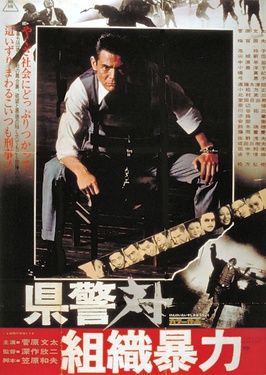
Cops vs. Thugs is a 1975 Japanese yakuza film directed by Kinji Fukasaku. It won two Blue Ribbon Awards in 1976: Best Director (Fukasaku) and Best Actor (Sugawara). Complex named it number 6 on their list of The 25 Best Yakuza Movies. Kino International released the film on DVD in North America in 2006.

Rampo Kitan: Game of Laplace is a Japanese anime television series produced by Lerche, directed by Seiji Kishi, and written by Makoto Uezu. The series aired on Fuji TV's Noitamina programming block from July 2 to September 17, 2015. The anime is inspired by the works of author Edogawa Ranpo and commemorates the 50th anniversary of his death in 1965.

Zutto Mae Kara Suki Deshita: Kokuhaku Jikkō Iinkai (ずっと前から好きでした。~告白実行委員会~), also known by its English title I've Always Liked You, is a 2016 anime romance film directed by Tetsuya Yanagisawa, written by Yoshimi Narita and produced by Qualia Animation. The film is based on the Kokuhaku Jikkō Iinkai ~Ren'ai Series~ Vocaloid song project by HoneyWorks. It revolves around a group of high school friends, who struggle to confess their love.

If You Were Young: Rage, also known as Our Dear Buddies, is a 1970 Japanese film financed, produced, directed and co-written by Kinji Fukasaku. The film stars Tetsuo Ishidate and Gin Maeda as a pair of Tokyo day laborers who along with three other friends pool their money together to buy a dump truck, which they dub "Independence No. 1". The film was, for a time, thought to be lost.
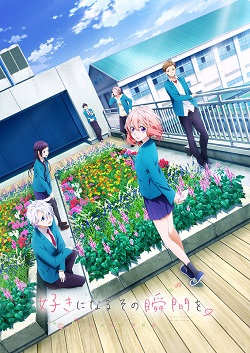
Suki ni Naru Sono Shunkan o: Kokuhaku Jikkō Iinkai (好きになるその瞬間を。~告白実行委員会~), also known by its English title The Moment You Fall in Love, is a 2016 Japanese animated youth romance film directed by Tetsuya Yanagisawa, written by Yoshimi Narita, and produced by Qualia Animation. The film is based on Vocaloid songs from Kokuhaku Jikkō Iinkai ~Ren'ai Series~ by HoneyWorks. It is the second film based on Kokuhaku Jikkō Iinkai ~Renai Series~ songs, following Zutto Mae Kara Suki Deshita. It was released in Japan by Aniplex on December 17, 2016, and in the Philippines on April 5, 2017 by ODEX. Crunchyroll began streaming the film on June 6, 2017.
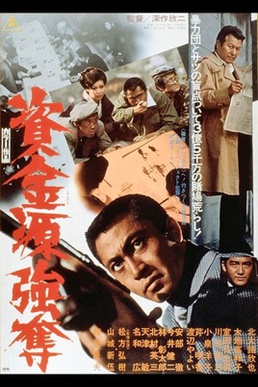
Cross the Rubicon!, also known as Plundering the Source of Capital and Gambling Den Heist, is a 1975 Japanese yakuza film directed by Kinji Fukasaku.
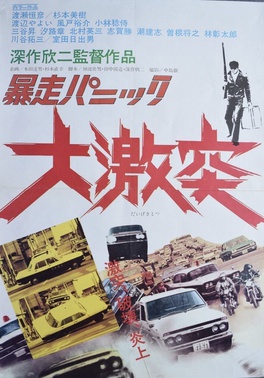
Violent Panic: The Big Crash, also known as Great Collision, is a 1976 Japanese heist film directed by Kinji Fukasaku.

Blackmail Is My Life, also known as Blackmail Is My Business, is a 1968 Japanese crime film directed by Kinji Fukasaku.
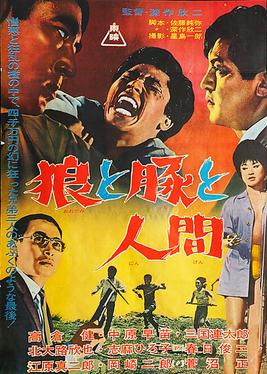
Wolves, Pigs and Men is a 1964 Japanese black-and-white crime film directed by Kinji Fukasaku.
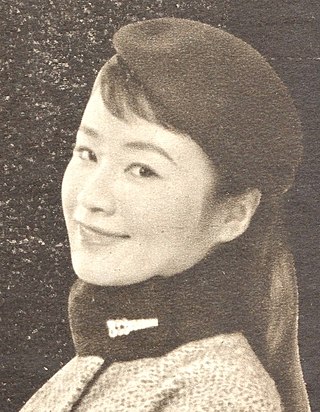
Sanae Nakahara was a Japanese actress from Tokyo. She starred in over 80 films and television shows, the most prominent being her role in the films Lady Snowblood (1973), Shogun's Samurai (1978), and Day of Resurrection (1980). Her husband was famed Japanese film director Kinji Fukasaku, and her son, Kenta Fukasaku, is another well-known Japanese film director.

Toshiko Kobayashi was a Japanese actress active from 1949 to 1980.
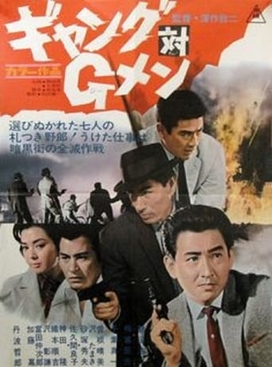
Gang vs. G-Men is a 1962 Japanese color crime thriller film directed by Kinji Fukasaku starring Kōji Tsuruta, Shinichi Chiba, and Tetsurō Tamba. In an interview with Chris Desjardins contained in the book Outlaw Masters of Japanese Film, Fukasaku called the film "the story of an ex-yakuza who becomes an undercover policeman."

League of Gangsters is a 1963 Japanese black-and-white crime action film directed by Kinji Fukasaku starring Ryōhei Uchida and Kei Satō. It was Uchida's first starring role in a film.
